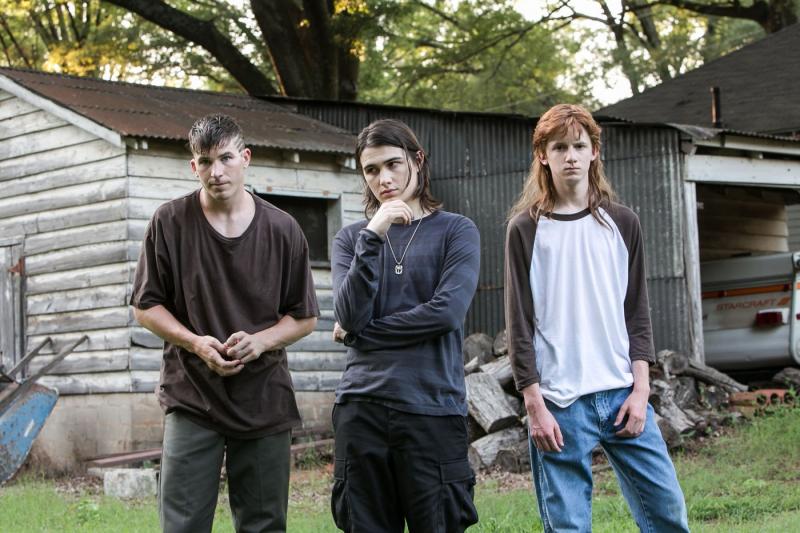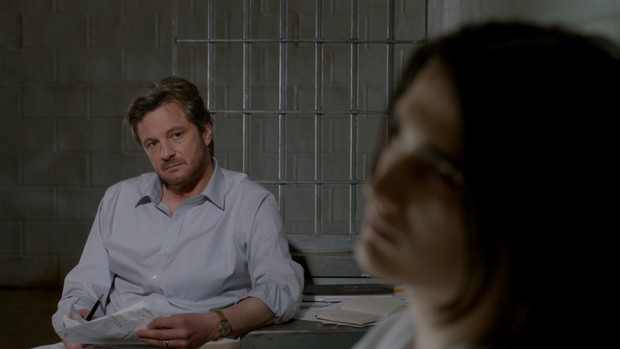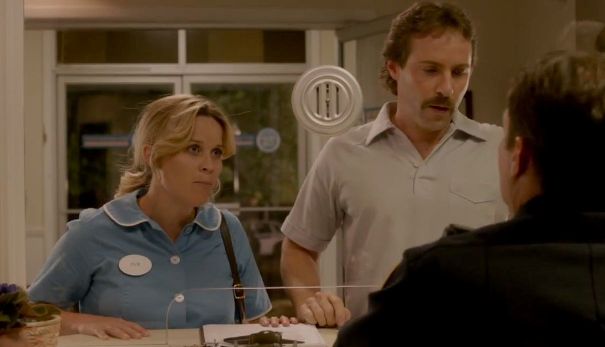Devil's Knot | reviews, news & interviews
Devil's Knot
Devil's Knot
Reese Witherspoon and Colin Firth in a tangled true tale of crime and injustice

Two knotted horrors stained West Memphis, Arkansas in 1993. Three 8-year-old boys, Stevie Branch, Christopher Byers and Michael Moore, went cycling on a sunny spring afternoon. Their torn, bruised and in Byers’ case castrated bodies were dragged from a stream the next day. Three local teenage boys, black-garbed outsiders Damien Echols, Jason Baldwin and Jessie Misskelley, Jr., were then tried for the crimes with a carelessness, incompetence and prejudice which seemed actively malicious. This “West Memphis Three” sacrificed 18 years in jail, as authorities who had in some cases risen to power on the back of the verdicts ensured they stood, despite an overwhelming weight of evidence against them. A rare and nonsensical Alford plea allowed the three’s release, unpardoned but maintaining their innocence, in 2011.
 The Peter Jackson-produced West of Memphis (2012) has the highest UK profile of several documentaries which made the case a cause celebre. It was a campaigning film, highlighting how little innocence can count in US justice’s venal byways. This first dramatic account treads a quieter, more circumspect path. Director Atom Egoyan is fascinated with buried, often traumatic secrets. A hunt for a missing, murdered child is the horror behind the sexual sadness and pain of Exotica (1994), and the yellow school bus glimpsed early in Devil’s Knot recalls the town who lose a bus full of children beneath the ice in The Sweet Hereafter (1997). There was a fairy tale elegance and heartbreaking profundity to the latter film. Egoyan’s response to West Memphis’s loss is intentionally less certain and satisfying.
The Peter Jackson-produced West of Memphis (2012) has the highest UK profile of several documentaries which made the case a cause celebre. It was a campaigning film, highlighting how little innocence can count in US justice’s venal byways. This first dramatic account treads a quieter, more circumspect path. Director Atom Egoyan is fascinated with buried, often traumatic secrets. A hunt for a missing, murdered child is the horror behind the sexual sadness and pain of Exotica (1994), and the yellow school bus glimpsed early in Devil’s Knot recalls the town who lose a bus full of children beneath the ice in The Sweet Hereafter (1997). There was a fairy tale elegance and heartbreaking profundity to the latter film. Egoyan’s response to West Memphis’s loss is intentionally less certain and satisfying.
 Reese Witherspoon is Pam Hobbs, mother of murdered Stevie, and Colin Firth is private investigator Ron Lax, pictured above right, who helped destroy the case against the West Memphis Three. Both give diligent, unstarry turns. Witherspoon’s Hobbs is a Southern Christian who tears locks of her hair out in grief, but comes to doubt the Satanic conspiracy the accused are believed to be part of in a conservative town bent on retribution. Firth slips under the skin of the quietly decent and angry Lax, a prosperous private eye helpless to directly effect West Memphis’s kangaroo court. They blend in with a strong cast including Alessandro Nivola as Terry Hobbs, pictured above left with Witherspoon, Pam’s watchful, faintly dangerous husband, and Egoyan regular Bruce Greenwood as Judge David Burnett, almost drumming his fingers with impatience to get to the guilty verdict.
Reese Witherspoon is Pam Hobbs, mother of murdered Stevie, and Colin Firth is private investigator Ron Lax, pictured above right, who helped destroy the case against the West Memphis Three. Both give diligent, unstarry turns. Witherspoon’s Hobbs is a Southern Christian who tears locks of her hair out in grief, but comes to doubt the Satanic conspiracy the accused are believed to be part of in a conservative town bent on retribution. Firth slips under the skin of the quietly decent and angry Lax, a prosperous private eye helpless to directly effect West Memphis’s kangaroo court. They blend in with a strong cast including Alessandro Nivola as Terry Hobbs, pictured above left with Witherspoon, Pam’s watchful, faintly dangerous husband, and Egoyan regular Bruce Greenwood as Judge David Burnett, almost drumming his fingers with impatience to get to the guilty verdict.
The grisly comedy of the flagrantly biased courtroom makes the injustice clear. Egoyan, though, also humanises the staggeringly inept police by showing them wading through the stream, discovering and holding the boys’ corpses: the spark for a 21st century trial compared here to Arthur Miller’s Salem.
Egoyan wants to leave us off-balance, turned around by contrasting perspectives, engaged by the mystery of the murdered boys’ fate, not the documentarians’ solution to the accused boys’ innocence. He isn’t helped by a script where characters explain themselves in Hollywood-style speeches, even as Hollywood’s satisfying resolutions are spurned. It’s a film I want to see again, in case the deeper mystery Egoyan aimed for is lurking in its murderous woods and human masks. But it feels as if he’s missed his subtle mark, veering between convention and understatement to underwhelming effect.
Overleaf: Watch the trailer for Devil's Knot
Two knotted horrors stained West Memphis, Arkansas in 1993. Three 8-year-old boys, Stevie Branch, Christopher Byers and Michael Moore, went cycling on a sunny spring afternoon. Their torn, bruised and in Byers’ case castrated bodies were dragged from a stream the next day. Three local teenage boys, black-garbed outsiders Damien Echols, Jason Baldwin and Jessie Misskelley, Jr., were then tried for the crimes with a carelessness, incompetence and prejudice which seemed actively malicious. This “West Memphis Three” sacrificed 18 years in jail, as authorities who had in some cases risen to power on the back of the verdicts ensured they stood, despite an overwhelming weight of evidence against them. A rare and nonsensical Alford plea allowed the three’s release, unpardoned but maintaining their innocence, in 2011.
 The Peter Jackson-produced West of Memphis (2012) has the highest UK profile of several documentaries which made the case a cause celebre. It was a campaigning film, highlighting how little innocence can count in US justice’s venal byways. This first dramatic account treads a quieter, more circumspect path. Director Atom Egoyan is fascinated with buried, often traumatic secrets. A hunt for a missing, murdered child is the horror behind the sexual sadness and pain of Exotica (1994), and the yellow school bus glimpsed early in Devil’s Knot recalls the town who lose a bus full of children beneath the ice in The Sweet Hereafter (1997). There was a fairy tale elegance and heartbreaking profundity to the latter film. Egoyan’s response to West Memphis’s loss is intentionally less certain and satisfying.
The Peter Jackson-produced West of Memphis (2012) has the highest UK profile of several documentaries which made the case a cause celebre. It was a campaigning film, highlighting how little innocence can count in US justice’s venal byways. This first dramatic account treads a quieter, more circumspect path. Director Atom Egoyan is fascinated with buried, often traumatic secrets. A hunt for a missing, murdered child is the horror behind the sexual sadness and pain of Exotica (1994), and the yellow school bus glimpsed early in Devil’s Knot recalls the town who lose a bus full of children beneath the ice in The Sweet Hereafter (1997). There was a fairy tale elegance and heartbreaking profundity to the latter film. Egoyan’s response to West Memphis’s loss is intentionally less certain and satisfying.
 Reese Witherspoon is Pam Hobbs, mother of murdered Stevie, and Colin Firth is private investigator Ron Lax, pictured above right, who helped destroy the case against the West Memphis Three. Both give diligent, unstarry turns. Witherspoon’s Hobbs is a Southern Christian who tears locks of her hair out in grief, but comes to doubt the Satanic conspiracy the accused are believed to be part of in a conservative town bent on retribution. Firth slips under the skin of the quietly decent and angry Lax, a prosperous private eye helpless to directly effect West Memphis’s kangaroo court. They blend in with a strong cast including Alessandro Nivola as Terry Hobbs, pictured above left with Witherspoon, Pam’s watchful, faintly dangerous husband, and Egoyan regular Bruce Greenwood as Judge David Burnett, almost drumming his fingers with impatience to get to the guilty verdict.
Reese Witherspoon is Pam Hobbs, mother of murdered Stevie, and Colin Firth is private investigator Ron Lax, pictured above right, who helped destroy the case against the West Memphis Three. Both give diligent, unstarry turns. Witherspoon’s Hobbs is a Southern Christian who tears locks of her hair out in grief, but comes to doubt the Satanic conspiracy the accused are believed to be part of in a conservative town bent on retribution. Firth slips under the skin of the quietly decent and angry Lax, a prosperous private eye helpless to directly effect West Memphis’s kangaroo court. They blend in with a strong cast including Alessandro Nivola as Terry Hobbs, pictured above left with Witherspoon, Pam’s watchful, faintly dangerous husband, and Egoyan regular Bruce Greenwood as Judge David Burnett, almost drumming his fingers with impatience to get to the guilty verdict.
The grisly comedy of the flagrantly biased courtroom makes the injustice clear. Egoyan, though, also humanises the staggeringly inept police by showing them wading through the stream, discovering and holding the boys’ corpses: the spark for a 21st century trial compared here to Arthur Miller’s Salem.
Egoyan wants to leave us off-balance, turned around by contrasting perspectives, engaged by the mystery of the murdered boys’ fate, not the documentarians’ solution to the accused boys’ innocence. He isn’t helped by a script where characters explain themselves in Hollywood-style speeches, even as Hollywood’s satisfying resolutions are spurned. It’s a film I want to see again, in case the deeper mystery Egoyan aimed for is lurking in its murderous woods and human masks. But it feels as if he’s missed his subtle mark, veering between convention and understatement to underwhelming effect.
Overleaf: Watch the trailer for Devil's Knot
rating
Explore topics
Share this article
The future of Arts Journalism
You can stop theartsdesk.com closing!
We urgently need financing to survive. Our fundraising drive has thus far raised £49,000 but we need to reach £100,000 or we will be forced to close. Please contribute here: https://gofund.me/c3f6033d
And if you can forward this information to anyone who might assist, we’d be grateful.

Subscribe to theartsdesk.com
Thank you for continuing to read our work on theartsdesk.com. For unlimited access to every article in its entirety, including our archive of more than 15,000 pieces, we're asking for £5 per month or £40 per year. We feel it's a very good deal, and hope you do too.
To take a subscription now simply click here.
And if you're looking for that extra gift for a friend or family member, why not treat them to a theartsdesk.com gift subscription?
more Film
 Blu-ray: Darling
John Schlesinger's Sixties classic now feels problematic, but retains an icky fascination
Blu-ray: Darling
John Schlesinger's Sixties classic now feels problematic, but retains an icky fascination
 Tornado review - samurai swordswoman takes Scotland by storm
East meets West meets North of the Border in a wintry 18th-century actioner
Tornado review - samurai swordswoman takes Scotland by storm
East meets West meets North of the Border in a wintry 18th-century actioner
 Lollipop review - a family torn apart
Posy Sterling brilliantly conveys the torment of a homeless single mother denied her kids
Lollipop review - a family torn apart
Posy Sterling brilliantly conveys the torment of a homeless single mother denied her kids
 Big Star: The Nick Skelton Story review - the ways of a man with his mount
Documentary about the champion showjumping duo
Big Star: The Nick Skelton Story review - the ways of a man with his mount
Documentary about the champion showjumping duo
 Ballerina review - hollow point
Ana de Armas joins the Wick-verse to frenetic but soulless effect
Ballerina review - hollow point
Ana de Armas joins the Wick-verse to frenetic but soulless effect
 Blu-ray: Eclipse
The BFI has unearthed an unsettling 1977 thriller starring Tom Conti and Gay Hamilton
Blu-ray: Eclipse
The BFI has unearthed an unsettling 1977 thriller starring Tom Conti and Gay Hamilton
 The Ballad of Wallis Island review - the healing power of the old songs
Estranged folk duo reunites in a classy British comedy drama
The Ballad of Wallis Island review - the healing power of the old songs
Estranged folk duo reunites in a classy British comedy drama
 The Salt Path review - the transformative power of nature
Marianne Elliott brings Raynor Winn's memoir to the big screen
The Salt Path review - the transformative power of nature
Marianne Elliott brings Raynor Winn's memoir to the big screen
 Bogancloch review - every frame a work of art
Living off grid might be the meaning of happiness
Bogancloch review - every frame a work of art
Living off grid might be the meaning of happiness
 When the Light Breaks review - only lovers left alive
Tender close-up on young love, grief and growing-up in Iceland
When the Light Breaks review - only lovers left alive
Tender close-up on young love, grief and growing-up in Iceland

Add comment